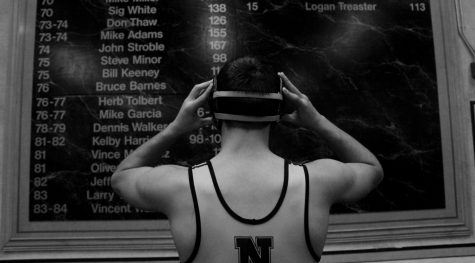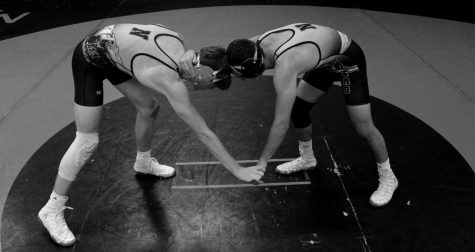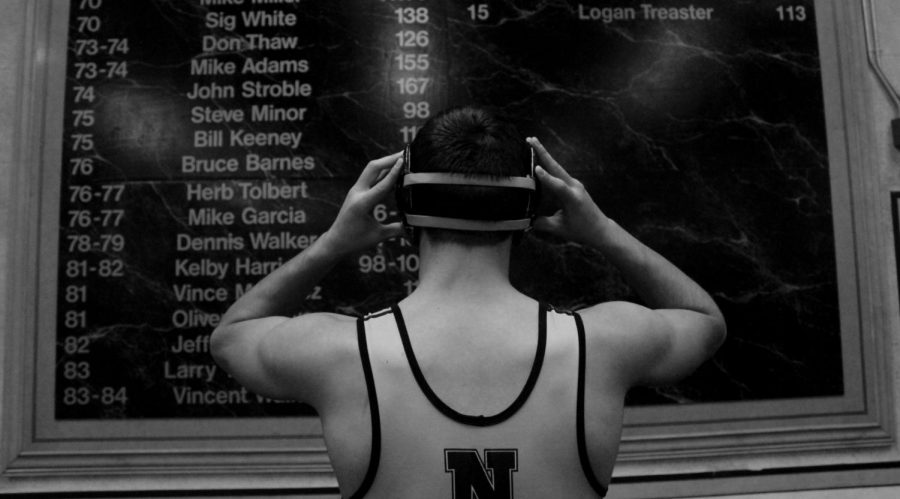Weighing In
Wrestlers explain, compare season diets
More stories from Kaete Schmidt
Contorting their limbs in unnatural positions, using every muscle in their bodies and making moves on their opponent with non-stop adrenaline shows how physically demanding wrestling is during a match. While this sport requires energy and power on the mat, it also takes self-control and willpower, specifically when it comes to making weight.
During a time when teenage athletes’ bodies are growing and exerting more energy, it is often assumed that they require even more fuel to help compete at a higher level. However, wrestlers believe that they can achieve the same results without eating a tremendous amount.
“I think whenever people think of wrestlers, everyone thinks of starvation, that you’re not doing stuff and not eating for weeks on end but, in reality, we won’t eat just like the day of weigh-ins or maybe the night before,” senior Wyatt Hendrickson said.
According to the American Academy of Pediatrics, when losing weight, athletes should shoot to lose no more than 1.5 percent of their body weight each week. Refraining to such losses will result in the sole loss of fat. Once they pass that limit, they will begin losing muscle mass resulting in decreased performance levels.
“I believe by eating healthier foods, you can eat more which allows you to lose more weight versus some of the kids that just don’t eat then lose weight, which in turn stops metabolism, slows it down, and then gives them less energy to actually work out,” head varsity wrestling coach Tommy Edgmon said.
Wrestlers practice many healthy ways to lose weight, including diet change, along with different forms of exercise such as biking, running and occasionally swimming.
After wrestling for nine years and coaching for nine years, Edgmon has gained knowledge in how to guide athletes in relation to weight loss.
“I let the wrestlers choose [the way they diet]. If we have a spot that’s open and they feel they can make the weight, they have that choice to go down a weight class. They sometimes ask for advice on diet, what to eat, how many times to exercise to get to that weight,” Edgmon said. “At the start of the season, I always tell them if they have any questions about nutrition or what to eat, to ask me and we can go over some sort of plan. If you eat more of the healthier foods that will boost metabolism you can burn more fat.”
Throughout six years of wrestling and dieting, Hendrickson has discovered what food produces the best personal outcome. Hendrickson sticks to the Ketogenic (Keto) diet, consisting of eight ounces of steak on Monday through Wednesday and on Thursday and Friday, five ounces of steak or five to six ounces of tuna. In addition to his protein intake, Hendrickson eats an apple and cooked vegetables everyday. Despite common beliefs, Hendrickson said he feels like his body has greatly benefited from this diet.
“My body loves it. I have more energy, I feel better, I don’t get as hungry,” Hendrickson said. “Staying on it after two weeks, it gets easier and easier and you feel better. I have plenty of energy, nothing changes.”

While this diet may be similar to other heavyweight wrestlers, the diet changes greatly for lightweight participants. Junior Grant Treaster eats a Cliff bar for breakfast to keep his metabolism up, and on weekdays, allows himself a sandwich for lunch as well as pasta or salad for dinner. However, on weigh-in days, he eats a granola bar and an apple. This proves to be difficult for Treaster.
“It’s tough. You’ll see a lot of mental toughness, even just sitting through class making sure you’re staying awake. Your sleeping changes a little bit. You wake up in the middle of the night and your stomach’s telling you you’re hungry, but you can’t eat. You just gotta go back to sleep,” Treaster said.
Due to the lack of sleep and food, Treaster said that he himself as well as others struggle throughout the season, although each wrestler handles the way they diet in various ways.
“It’s kind of hard, but once your body gets used to it, throughout the year it becomes easier for you. You don’t want water as much or like you don’t need food as much,” junior Boone Roberson said.

Not only can a diet affect sleep and energy, according to Treaster it can also affect mentality.
“It gets really stressful on your body. I think mentally, it can kind of break you down. Some people break down from losing weight and if you don’t know how to lose the weight right, it can ruin your body,” Treaster said.
Despite the stress put on his body, Treaster finds his motivation to wrestle in the energy he gets from winning as well as his future goals to wrestle at the United States Naval Academy.
“I think it always helps boost your confidence whenever you get a win,” Treaster said.

